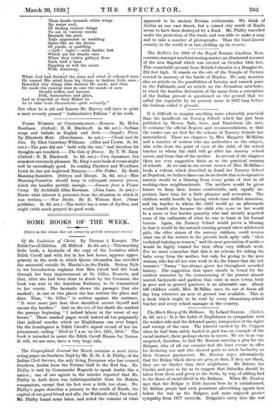It is difficult to imagine anything more admirably practical than
the handbook on Nursery Schools which has just been published by Messrs. Bale, Sons, and Danielsson (5s. net). It contains the official Reports and recommendations, so that the reader can see how far the scheme of Nursery Schools has materialized. There are chapters by Miss Margaret McMillan and a number of writers who are authorities on the subject, who write from the point of view of the child, of the school teacher to whom the child will go after his nursery school career, and from that of the mother. In several of the chapters there are very suggestive hints as to the practical running of schools. As we said in our recent review of Miss McMillan s book, a volume which described in detail her Nursery School at Deptford, we believe there can be no doubt that a co-operative nursery would be a blessing from every point of view in all working-class neighbourhoods. The mothers would be given leisure to keep their homes comfortable, and, equally im- portant, have time for a little pleasure and recreation. The children would benefit by having whole-time skilled attention, and the teacher to whom the child would go on afterwards would benefit also because the child who came to her would be a more or less known quantity who had already acquired some of the rudiments of what he was to learn in his formal lessons. Again, the Nursery School would prove a blessing in that it would be the natural training-ground where adolescent girls, the elder sisters of the nursery children, could receive what one of the writers in the present book aptly calls " their technical training as women," and the next generation of mothers would be highly trained for their often very difficult work. For we must remember that this is no scheme for taking the baby away from the mother, but only for giving to the pool woman, who has all her own work to do, the leisure that the rich woman's "Nanny " has always given her throughout recorded history. The suggestion that space should be found for the outdoor nurseries by the communizing of the present almost wasted backyards and gardens that exist in most towns, both in poor and in genteel quarters, is an admirable one. About 160 children could, Miss McMillan says, be out of doors all day long wherever an acre of ground was available. This is a book which ought to be read by every elementary-school teacher and every school manager in the country.




































 Previous page
Previous page